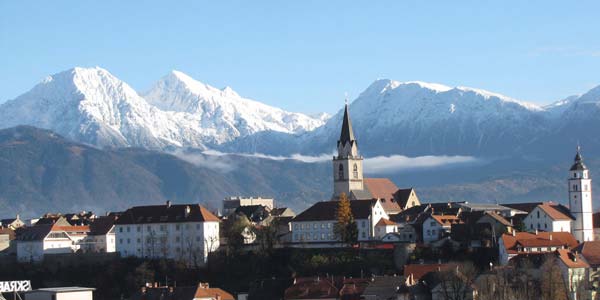Wednesday
My University of Ljubljana colleague Igor Maver took Julia and me on the perfect outing the other day: a visit to the Slovenian Alps. In the distance, we could see Slovenia’s pride and joy—Triglav, the mountain featured on the Slovenian flag—and when we arrived in the town of Kranj we got an even closer view of other peaks. We also visited the source of the Sava River, which joins the Danube after flowing through Slovenia, Croatia, Bosnia-Herzegovina, and Serbia. The experience prompted me to revisit Wordsworth’s mountain experience in The Prelude.
In his case, he “borrows” a boat to witness his mountain. And while the excursion starts peacefully enough, in the end he finds himself overwhelmed by its grim shape, which “towered up between me and the stars.” Nature being vaster and more awe-inspiring than he realized, he turns around and heads for home. While we normally associate Wordsworth more with daffodils than with Lord Byron’s “dark sublime,” he could go in that other directions as well.
We weren’t overwhelmed quite so much. In fact, the snow-capped mountains were more like the “elfin pinnace” that Wordsworth initially describes. Had we been approaching them in the dark, as Wordsworth does, perhaps the experience would have been different.
One summer evening (led by her) I found
A little boat tied to a willow tree
Within a rocky cove, its usual home.
Straight I unloosed her chain, and stepping in
Pushed from the shore. It was an act of stealth
And troubled pleasure, nor without the voice
Of mountain-echoes did my boat move on;
Leaving behind her still, on either side,
Small circles glittering idly in the moon,
Until they melted all into one track
Of sparkling light. But now, like one who rows,
Proud of his skill, to reach a chosen point
With an unswerving line, I fixed my view
Upon the summit of a craggy ridge,
The horizon’s utmost boundary; far above
Was nothing but the stars and the grey sky.
She was an elfin pinnace; lustily
I dipped my oars into the silent lake,
And, as I rose upon the stroke, my boat
Went heaving through the water like a swan;
When, from behind that craggy steep till then
The horizon’s bound, a huge peak, black and huge,
As if with voluntary power instinct,
Upreared its head. I struck and struck again,
And growing still in stature the grim shape
Towered up between me and the stars, and still,
For so it seemed, with purpose of its own
And measured motion like a living thing,
Strode after me. With trembling oars I turned,
And through the silent water stole my way
Back to the covert of the willow tree;
Wordsworth’s return to the safety of the willow tree reminds me of James Stephens’s “The Shell,” which I remember admiring when I was 14:
AND then I pressed the shell
Close to my ear
And listened well,
And straightway like a bell
Came low and clear
The slow, sad murmur of the distant seas,
Whipped by an icy breeze
Upon a shore
Wind-swept and desolate.
It was a sunless strand that never bore
The footprint of a man,
Nor felt the weight
Since time began
Of any human quality or stir
Save what the dreary winds and waves incur.
And in the hush of waters was the sound
Of pebbles rolling round,
For ever rolling with a hollow sound.
And bubbling sea-weeds as the waters go
Swish to and fro
Their long, cold tentacles of slimy grey.
There was no day,
Nor ever came a night
Setting the stars alight
To wonder at the moon:
Was twilight only and the frightened croon,
Smitten to whimpers, of the dreary wind
And waves that journeyed blind-
And then I loosed my ear … O, it was sweet
To hear a cart go jolting down the street.
Ah yes, the comforts of the familiar.
